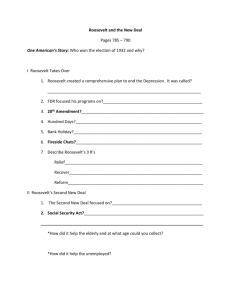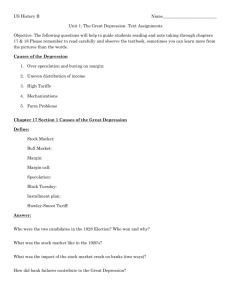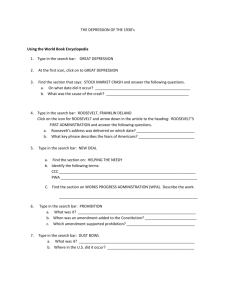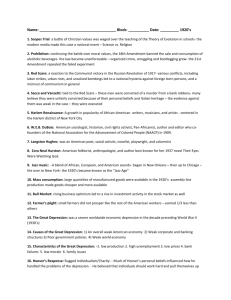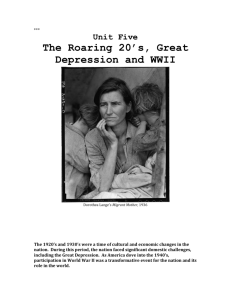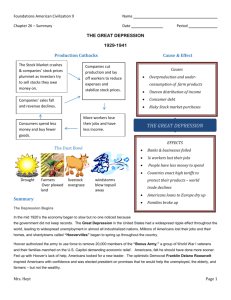Franklin Delano Roosevelt
advertisement
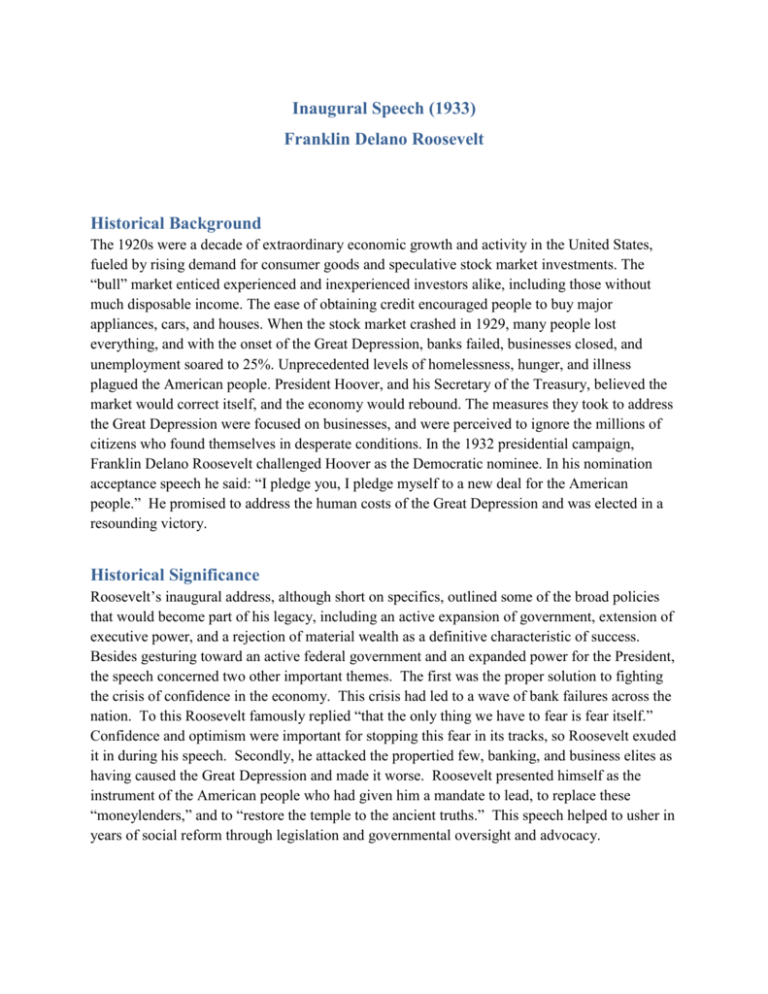
Inaugural Speech (1933) Franklin Delano Roosevelt Historical Background The 1920s were a decade of extraordinary economic growth and activity in the United States, fueled by rising demand for consumer goods and speculative stock market investments. The “bull” market enticed experienced and inexperienced investors alike, including those without much disposable income. The ease of obtaining credit encouraged people to buy major appliances, cars, and houses. When the stock market crashed in 1929, many people lost everything, and with the onset of the Great Depression, banks failed, businesses closed, and unemployment soared to 25%. Unprecedented levels of homelessness, hunger, and illness plagued the American people. President Hoover, and his Secretary of the Treasury, believed the market would correct itself, and the economy would rebound. The measures they took to address the Great Depression were focused on businesses, and were perceived to ignore the millions of citizens who found themselves in desperate conditions. In the 1932 presidential campaign, Franklin Delano Roosevelt challenged Hoover as the Democratic nominee. In his nomination acceptance speech he said: “I pledge you, I pledge myself to a new deal for the American people.” He promised to address the human costs of the Great Depression and was elected in a resounding victory. Historical Significance Roosevelt’s inaugural address, although short on specifics, outlined some of the broad policies that would become part of his legacy, including an active expansion of government, extension of executive power, and a rejection of material wealth as a definitive characteristic of success. Besides gesturing toward an active federal government and an expanded power for the President, the speech concerned two other important themes. The first was the proper solution to fighting the crisis of confidence in the economy. This crisis had led to a wave of bank failures across the nation. To this Roosevelt famously replied “that the only thing we have to fear is fear itself.” Confidence and optimism were important for stopping this fear in its tracks, so Roosevelt exuded it in during his speech. Secondly, he attacked the propertied few, banking, and business elites as having caused the Great Depression and made it worse. Roosevelt presented himself as the instrument of the American people who had given him a mandate to lead, to replace these “moneylenders,” and to “restore the temple to the ancient truths.” This speech helped to usher in years of social reform through legislation and governmental oversight and advocacy. Key Concepts and Learning Objectives Concepts: Great Depression; New Deal; Wave Election; Realigning Election; Presidential Mandate; “Bank Holiday,” First Hundred Days Learning objectives: On completion of this unit, students will be able to: Describe President Roosevelt’s plan to deal with the Depression; define and describe the importance of FDR’s First Hundred Days; describe Roosevelt’s diagnosis of the causes of the Great Depression; compare and evaluate this diagnosis with other historical evidence; evaluate Roosevelt’s claim that “the simple and practical Constitution” did not stand in the way of efforts to deal with the Great Depression. Questions to Explore President Roosevelt equates the emergency of the Great Depression with being in a war. Do you agree with this assessment? Why or why not? What dangers could arise from treating an economic crisis like a war? How does being at war affect the balance of power between the branches of the national government? President Roosevelt argues that the financial collapse of the nation should be blamed on “unscrupulous money changers” and that in their haste they “have fled from their high seats in the temple of our civilization.” What is the proper place of religious language in public political speech? Have the applicable standards changed over time? Does it make a difference whether allusions to religious scriptures and beliefs are obvious or relatively subtle, as they are in this case? Why or why not? President Roosevelt argues that his restoration of the “temple” lies in embracing “social values more noble than mere monetary profit.” What national social values do Americans share that are higher or nobler than monetary profit? To what extent is it possible to share such values in a large, diverse nation such as the United States? Does individualism inevitably point toward greater emphasis of self-interest in society? Soaring political rhetoric has its own dangers, and the line between a leader and a demagogue is sometimes a fine one. Which side of the line does FDR walk in this speech where he uses evocative language to describe the “mandate” he was given from the American people, stresses the need to act and act now, and describes the previous order as “evil?” How do you think America was able to avoid the fate suffered by other countries, such as Germany, who experienced economic upheaval during the same time and ultimately declined into dictatorship? Do you credit leadership, institutions, or something else altogether?



